Drouot Auction House: Treasures and Curiosities for Every Budget
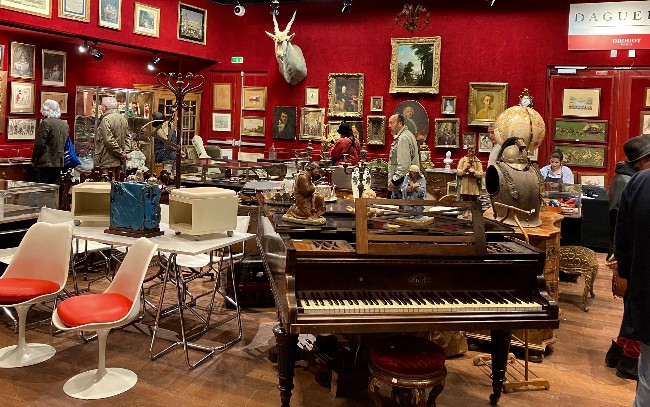

- SUBSCRIBE
- ALREADY SUBSCRIBED?
BECOME A BONJOUR PARIS MEMBER
Gain full access to our collection of over 5,000 articles and bring the City of Light into your life. Just 60 USD per year.
Find out why you should become a member here.
Sign in
Fill in your credentials below.
Have you ever wanted to bring some of that Parisian je ne sais quoi to your home or apartment? A few silver pieces, antique porcelain, an engraving, an astrolabe or perhaps an 18th-century portrait? Would you prefer Cubist art, Art Deco furniture, or an unusual treasure from another culture? Maybe you would just like to find a vintage pin or a designer purse.
Yes, you could brave the immense flea markets of Paris, should you be visiting. But flea markets, as entertaining as they are, can be daunting in size and intimidating, especially if language presents a barrier and haggling over price makes you uncomfortable. Yet there is another venue where all those enticing items and more can be had with eye-popping ease, and often at shockingly affordable prices. Where? At one of the world’s most famous auction houses: the Hôtel Drouot at 9, rue Drouot, in the 9th arrondissement.
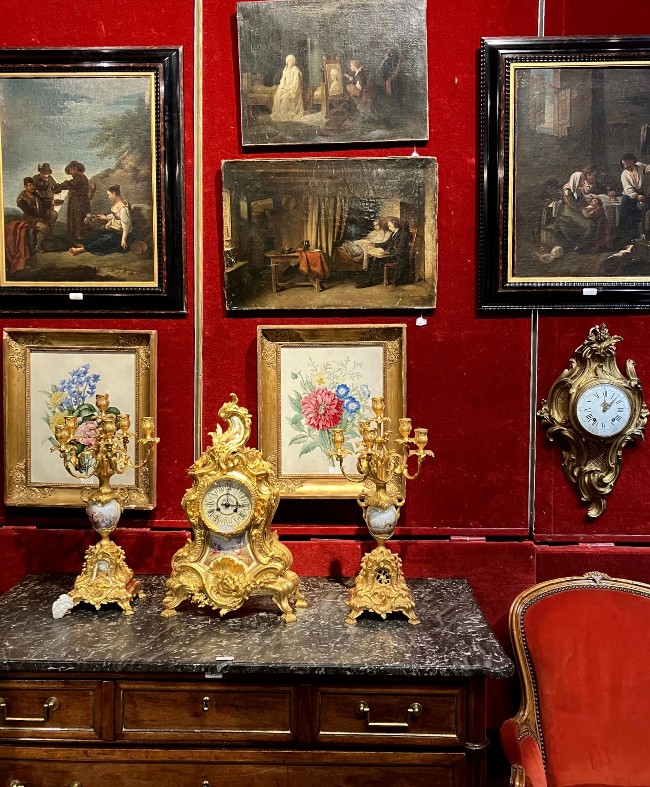
Clocks and paintings at Drouot in 2022. Photo credit: Ellen A
Auction houses like Drouot can seem rarified temples, reserved solely for elites and collectors with bottomless bank accounts. Nothing could be farther from the truth. Of course, Drouot can and does regularly put up items of great value. Later this month Drouot will auction off a fossilized dinosaur skeleton expected to sell for half a million euros. What many do not realize, however, is that Drouot’s ever changing and expanding inventory is vast and the normal range of auction prices runs from under 100 euros to several thousand. And that is where the excitement begins!
The first thing to know about Drouot is how accessible the bidding process is, and how inexpensive your winning bid may turn out to be. Whether you attend an auction in person, or travel online in your armchair to Paris, the auctioneers at Drouot dutifully describe and artfully display their wonders to the world. The breadth of history and personal story of the offerings can be mesmerizing.
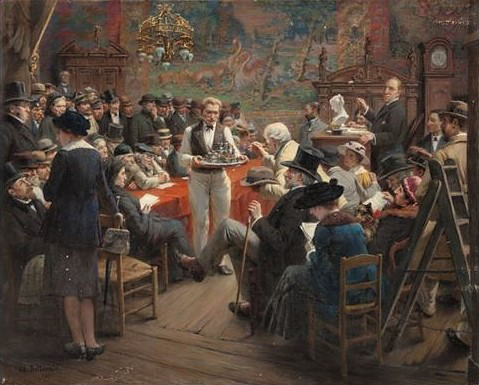
An Auction at the Hôtel Drouot, Paris, 1921, Public Domain
Don’t speak French? No problem. Drouot online offers several languages on their website (drouot.com). To make things easier for you, Drouot’s experts estimate in advance the range for the winning bid for each item, so you can decide for yourself how much you are willing to part with to acquire an item. As an online bidder, I have won bids well under 100 euros to become the happy owner of a 19th-century Gien cachepot, an early 20th-century gilded mirror, a hunting tapestry, a late 19th-century watercolor of a man and his dog in the snow, and a vintage burled-wood gaming box.
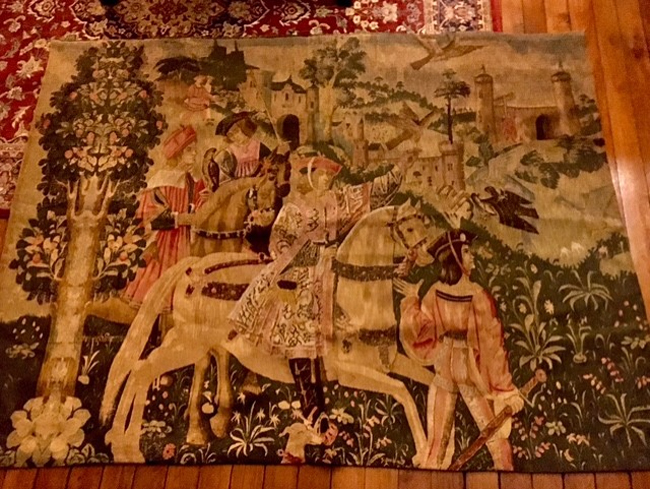
Printed tapestry on burlap type fabric – 30 euros – purchased January 2022. Photo credit: Ellen A.
The Hôtel Drouot has been in business since 1852. The bulk of their auction items comes from individual families and estates. Occasionally, they may offer the entire contents of a chateau or a luxe Paris apartment. As unique as the items may be, their background can be as fascinating as the item itself. In 1913, for example, the famous expressionist Charles Camoin, a friend of Matisse, cut up a number of his own paintings in a fit of depression and threw them into the trash on rue Lepic. Someone pulled them out and reassembled them. They wound up at auction at Drouot! Camoin, no doubt taken aback, had to sue to regain the rights to his own paintings.
Today Drouot works with dozens of appraisal-auction houses (called commissaire-priseur) whose knowledgeable staff collect and appraise the items that are brought to them, calling in special experts as needed in Old Masters, archeology, Japanese prints or oriental rugs, as the case may be. They then put together an auction catalogue for a date certain, some containing 300 to 400 objects to be auctioned in an afternoon. A single online auction catalogue might contain varied offerings ranging from costume jewelry and Baccarat glassware to officers’ sabers and verified Rembrandt etchings.
Drouot allows you to search with some specificity for objects you are interested in, but the site also links to auctions that are held outside of Paris, even in other countries, so be mindful of the venues and any shipping costs. To see only auctions that will be held at Drouot Paris, you can click on “Auctions” in the upper left of the drouot.com landing page and select “Auctions at the Hotel Drouot” from the drop down menu.
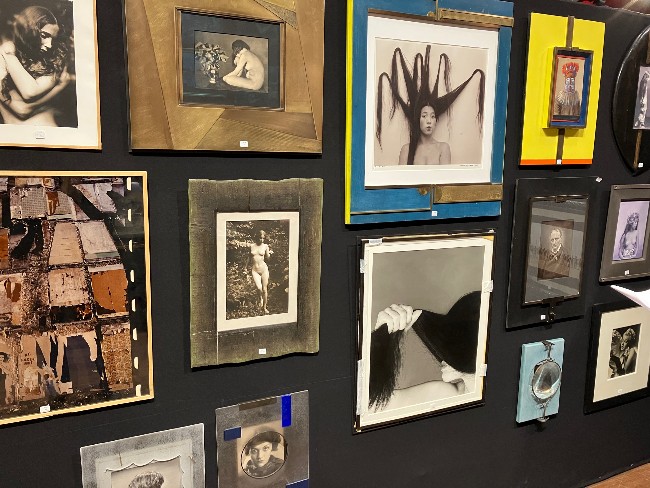
Art photography at Drouot. Photo credit: Ellen A
To bid on an item, simply register online with a credit card on the Drouot website, then register individually for any of the live auctions that are coming up. You can place bids on any item within your budget in an upcoming auction.
Placing an “automatic bid” allows the Drouot system to bid for you up to your maximum desired amount. For instance, you may see a charming painting by an unknown artist of the mid-19th century, estimated at 40 to 70 euros. If you place an automatic bid for 100 euros, the system will not bid 100 immediately, but will only bid up incrementally, so if others only bid up to 50 euros, yours would be the winning bid at 60.
When you bid, be sure to factor in the cost of the fees set by the original appraisal-auction house and by Drouot. Total fees normally amount to an additional 1/3 of your bid. If your winning bid is 60 euros for an item, you will need to pay an additional 20 euros in fees, so the total cost will be 80 euros.
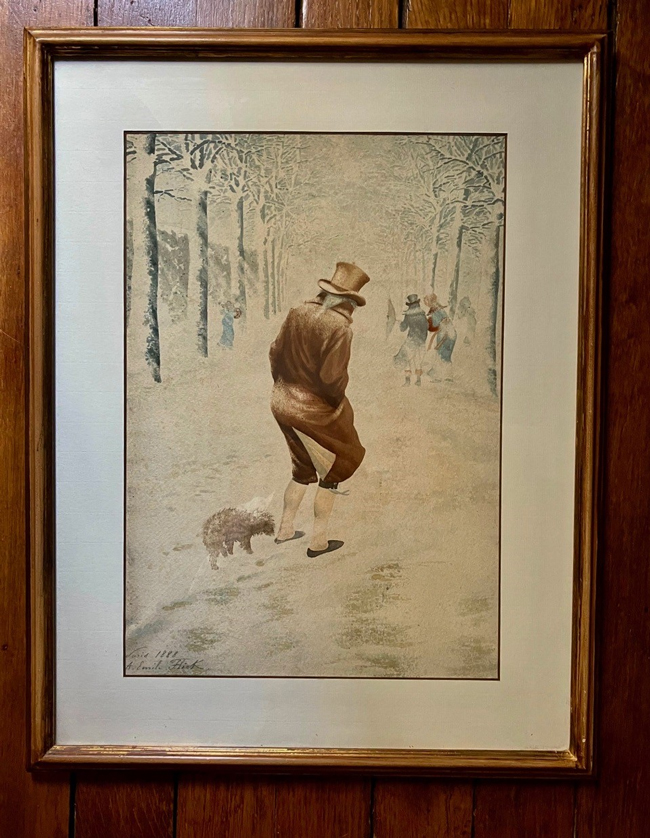
1888 watercolor by A. Emile Flick – 80 euros – purchased summer 2022, courtesy of Ellen A.
Bids on items of lesser value are placed in increments of 10, but the live auctioneer has the discretion to call for a higher amount. If bids for an item have mounted to 1500, for example, the auctioneer may ask next for 2000. You can attend your auction in person, and your automatic bid will still be in play, without your needing to raise your hand. You can also sign in and view the “live” auctions online. Some provide video from inside the auction room. Most bidding goes very quickly, so you have to be ready to push the button if you want to raise your bid online, or raise your hand if you are there in person.
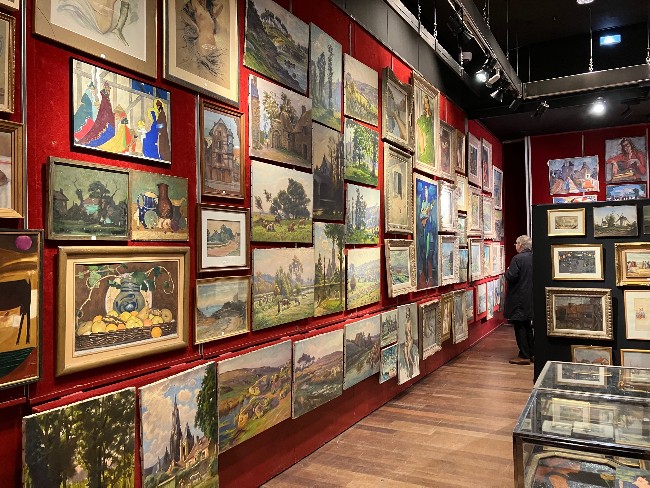
A wall of art at Drouot in 2022. Photo credit: Ellen A
You will normally have free access to the room containing all of the items in an upcoming auction on the day before, and again in the morning before an afternoon sale. At any given time, there are at least four or five rooms full of artwork, furniture or jewelry to be seen. Depending on the individual auctioneer and the quality of the offerings, these visits can be more entertaining than a trip to a museum. Personnel from the individual auction house will be there, can answer questions, and may even allow you to touch and examine some articles if you wish. Online, you can virtually visit the individual rooms the day before a live auction by going to the auction listing and clicking on “Visite de salle.”
If you are bidding in person at Drouot, you will settle up there, and may be able to take your item with you the same day. If your winning bid is online, you will receive a bordereau or invoice. Once paid, you will be sent a receipt that you can show to collect your item. If you don’t pick up your item right away, you may have to pay additional storage fees at Drouot, or at the individual auction house’s étude or street address.
Outside of Paris, you can obtain a rough estimate of shipping costs in advance for any item you wish to bid on. International rates can be costly, but may be worthwhile for a special item that is not too heavy or voluminous.

Vintage burled wood gaming box – 45 euros – purchased July 2021. Photo credit: Ellen A.
If you are already in Paris, or planning to come, do visit Drouot. After the auctions, you can stroll through that quarter of the 9th arrondissement that surrounds the auction house and seems never to have left the 19th century, where the shops in old passages evoke scenes from Balzac, Zola and Flaubert.
“It is only an auctioneer who can equally and impartially admire all schools of art.” Oscar Wilde
Hôtel Drouot
9, rue Drouot, 9th
Tel: +33 (0)1 48 00 20 00
Email: [email protected]

Drouot taxidermy eagle exhibit – auctioneer Millon (commisaire-priseur) – April 2018. Photo credit: Ellen A.
Lead photo credit : The Drouot auction room in 2022. Photo credit: Ellen A.
More in antiques shopping in Paris, Hôtel Drouot, Hôtel Drouot auction house, Vintage decor, vintage shopping in Paris









REPLY